
There are a lot of frogs around the world, how and why they sound like they do. I really wanted to know how frogs croak, why they croak, and if every frog sounds the same. So, I did some research and I found out some really interesting things.
So, why do frogs croak?
In almost all species it is the male frog that does the croaking. And that may be the biggest hint I can give you.
The male frogs croak to attract female frogs so that they can mate. Essentially the croaking is a serenade to the female frogs. The male hopes the female likes his song and comes his way.
Why do frogs croak at night?
Male frogs croak to attract a potential mating partner. This type of communication is effective because it can reach far and ponds or other waters are often quite large.
Frogs croak at night because this is the safest way to let females know that they are available. It is the safest way to go because in this way the frogs can avoid day-time and visual predators.
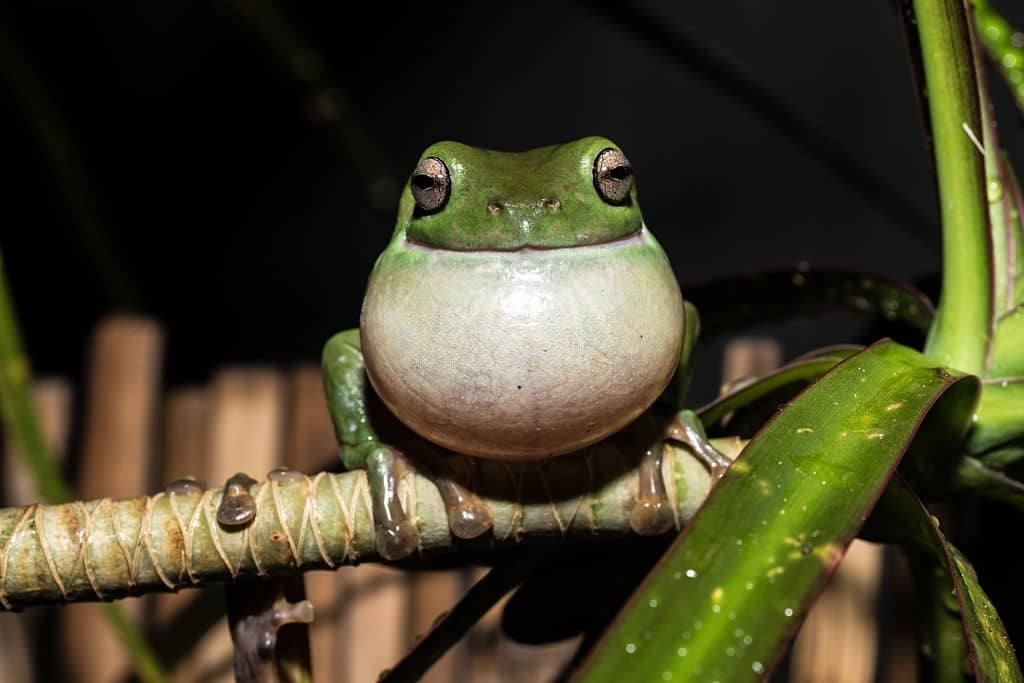
Why do frogs croak during the day?
Whether a frog croaks during the day depends on the species.
Most species will only call at night and also will be much more active during the night hours because it is the safe way to go. However, the frog that is calling at daytime has a different strategy. They most likely croak to mark their territory or just a quick call for a mate.
Some frogs croak almost only during the day. The poison dart frogs, for example, will croak all day long. This is because they don’t have to worry about other predators. It is much better for them to croak during the day because that’s the time they can be seen. Bright warning colors mean absolutely nothing when it is night time and no one can see them.
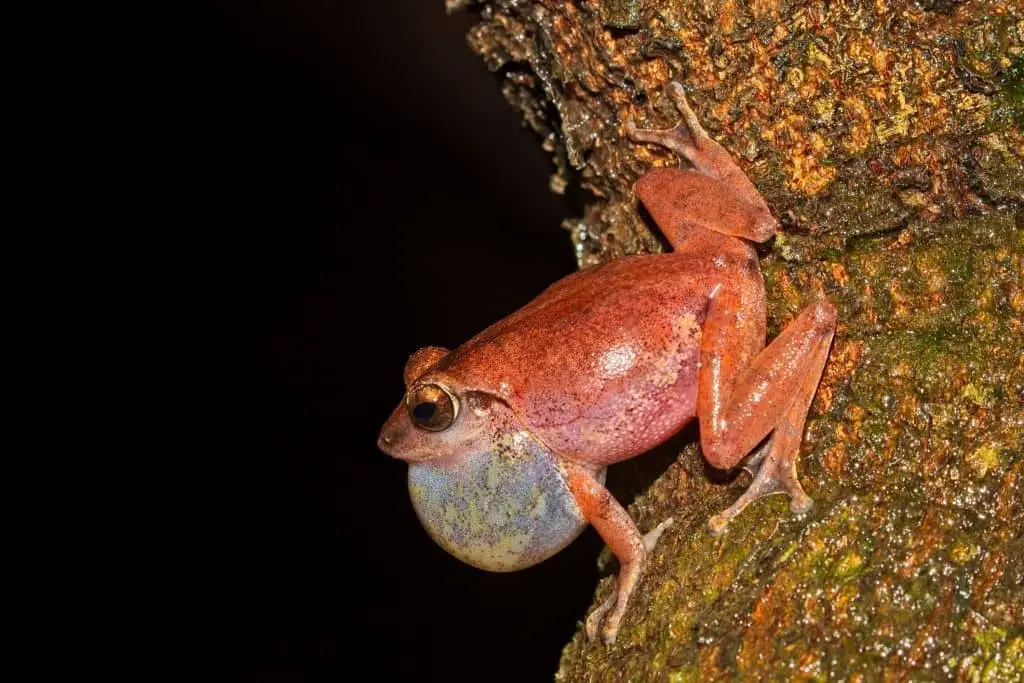
Why do frogs croak before a storm?
Some people say that frogs (and other animals) can predict when there is an upcoming storm and that is why they croak. I am a believer in this story. Now, I am not a scientist but there is some research out there that states that frogs can detect changes in barometric pressure.
Now other people say that frogs croak all the time but you just hear them louder just before a storm. This would be because the sound is reflected and magnified by the low hanging clouds of the storm. The croaking of the frogs will echo more loudly because of that.
There are also experts that say that they croak just before it starts to rain to attract a mate. A good rain means that there is more “watery real estate” to choose from and thus a higher chance of successful reproduction.
How do frogs croak?
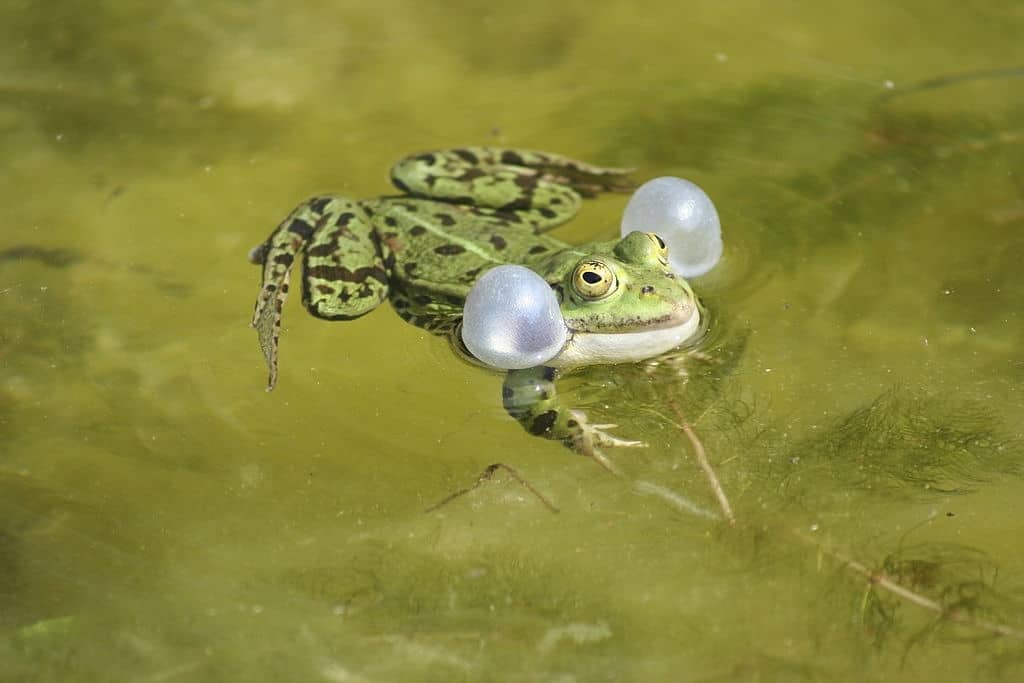
So, how do frogs croak? Frogs croak by moving air over their vocal cords and causing them to vibrate. To amplify this sound they make use of the sack at the bottom of their mouth. This sack can stretch out like a balloon and a frog can use this to make the sound they make stronger. Amplifying allows for the sound to travel up to 1 mile away.
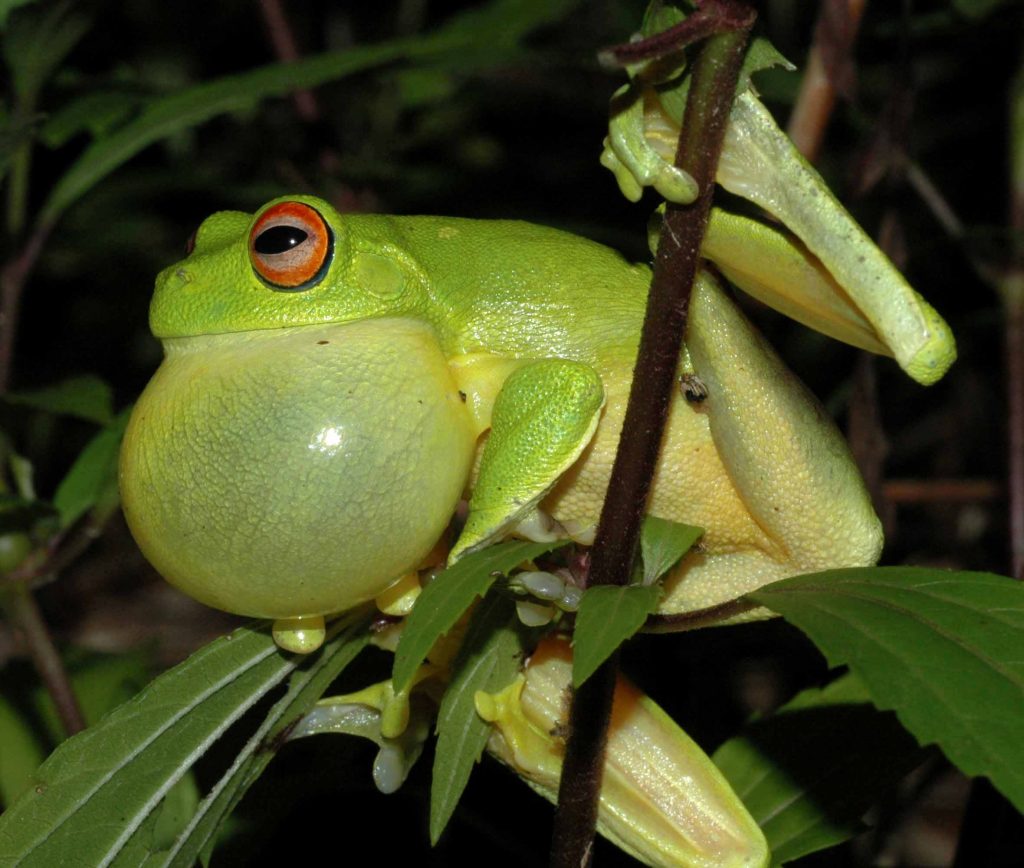
Frogs have vocal cords just like humans do. By moving air over the vocal cords, they start to vibrate and these vibrations then produce a sound. But frogs use more than just their vocal cords when they croak. Frogs also have a thing that is called a vocal sac (see image below). This vocal sac works like an inflatable amplifier.
How do frogs make their sound?
When a frog starts to croak, he breathes in and then closes its nostrils. This may sound weird but this is necessary for the flow of air. Closing the nostrils forces the air backward and forward between the lungs and the vocal sac. Air from the lungs is pushed over the vocal cords and then it goes through the windpipe and it ends in the vocal sac. The glottis (opening into and out of the lungs) then controls the flow of air and the production of the croaking sound.
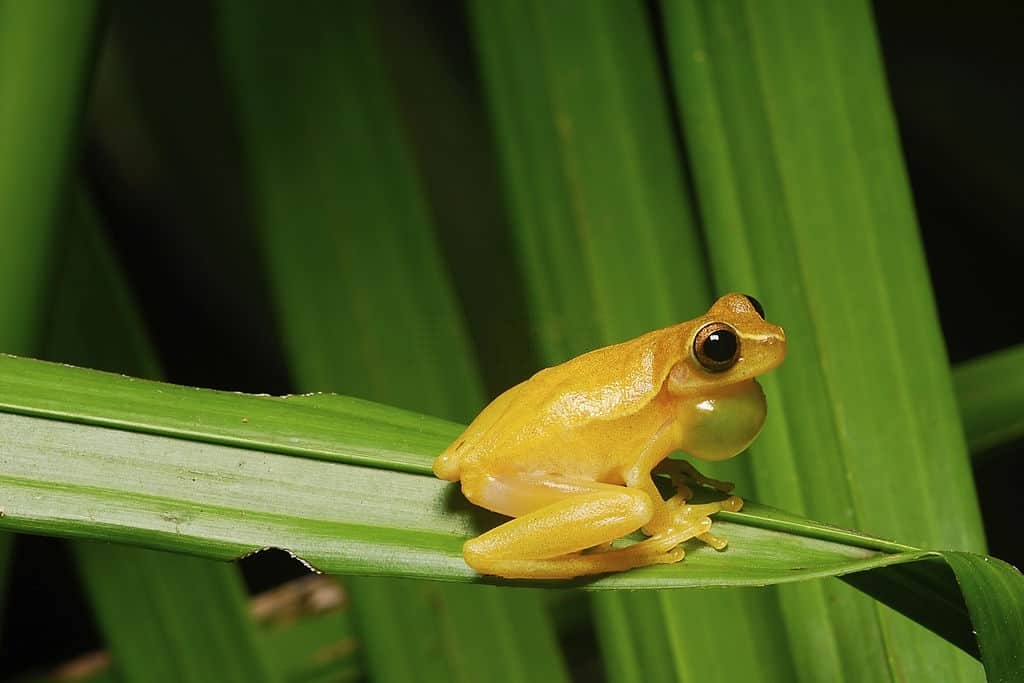
Do all frogs sound the same?
No, not all frogs sound the same. This depends largely on the species. Every species has a different sounding call. Male frogs want to be absolutely certain that they attract a female of their own species (otherwise the effort he put in was for nothing). The sounds can vary from a very low pitched sound like “bonk”, a very high-pitched whirring and other male frogs sound more like an insect. Now, the ears of female frogs are specially tuned to the sound of their own species. This makes it easier for the female frog to find the frog of her own species within a wall of sound from the other male frogs.
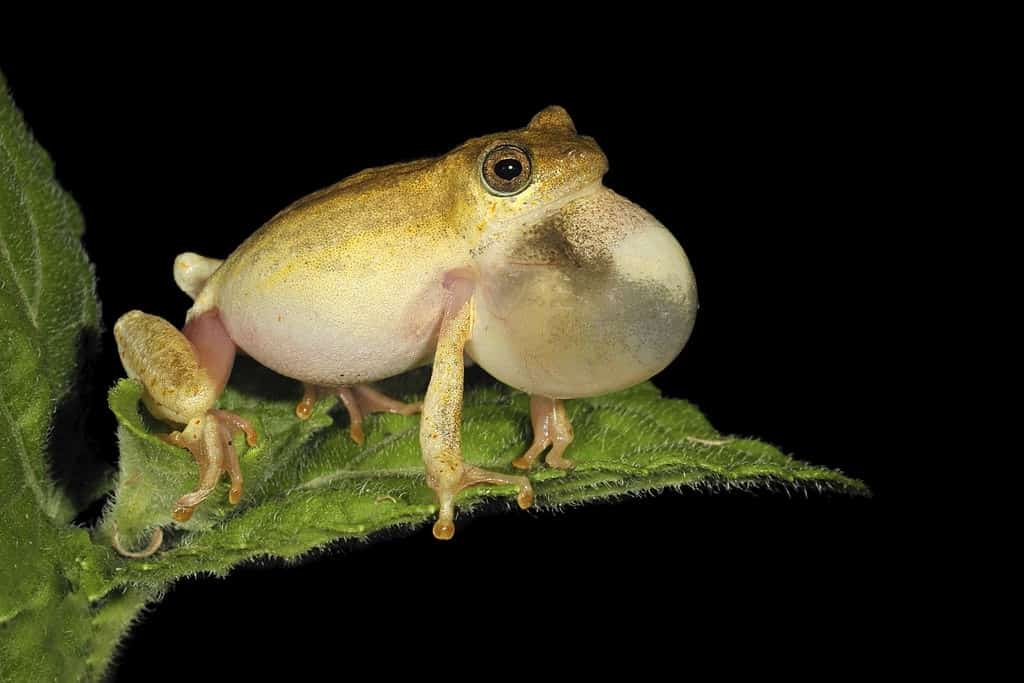
What do the calls of different species sound like?
Different frog species have different sounding calls. This is because the female has to know which croaking frog is her own species.
Below you’ll find the croaking sound of different frog species.
Grey Tree Frog
Green Tree Frog
Green Frog
Leopard Frog
Mink Frog
Pacman Frog
Wood Frog
Did you know there were so many different sounds? I surely didn’t but I find it awesome to hear that every frog species has their own.
How do frogs hear the croaking of other frogs?
Even though frogs don’t have a set of ears that look like ours, they do have an eardrum and an inner ear. The eardrum of a frog is located on the side of his head and acts as a shield and cover for their inner ear. This is also called the tympanic membrane or tympanum.
The tympanum works similar to our own eardrum. Inside there a is bone attached to the tympanum. When sound is made and it reaches the membrane, the vibrations go down the bone to the inner ear where the semicircular canals, cochlea, and papilla are. Also interesting to know is the fact that the tympanum works both underwater as above water to hear a sound.
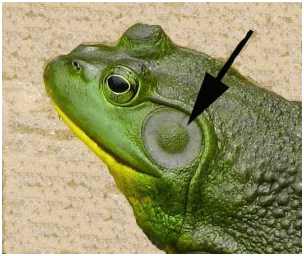
Fun Fact: Frogs don’t hear high frequencies well. This is because of the short distance between their eardrums. This happens because there is more distance needed between the eardrums to hear high frequencies. However, frogs are great at hearing lower frequencies!
Related questions to ‘Why do frogs croak?’
How can I stop frogs from croaking?
You can stop frogs from croaking by taking the following steps:
1 – Look for cracks on your porch or search for a pile of wet wood and leaves. Normally this is the place where frogs will set up their home.
2 – Grab a hose and flush the cracks & clean up the pile of wet wood and leaves. You may notice that some frogs will jump out of the crack when you thoroughly flush it. Just grab the frogs, and put them elsewhere. Over your garden fence for example.
3 – Make a mix of salt water, pour it in a bottle and spray the area around your house with it. This mixture makes the frog’s feet uncomfortable and normally they will then stop coming.
Do female frogs croak?
No, female frogs do not croak. They can, however, make a short chirpy sound. But, normally males are the ones that croak. The male frogs croak to advertise their species, size, location and things like fitness to attract a possible mating partner.
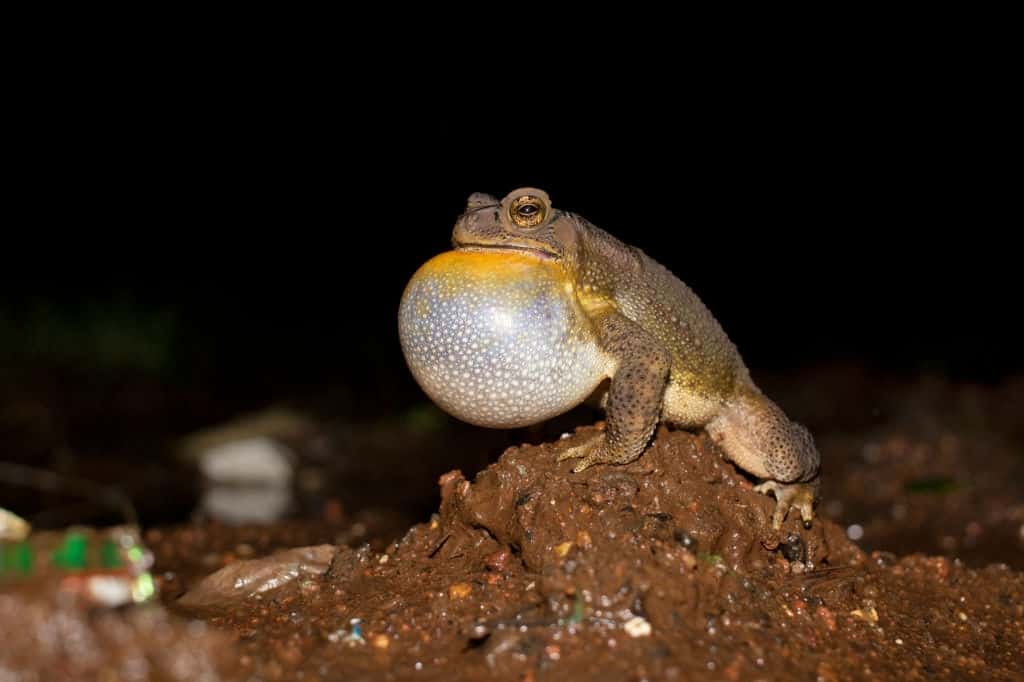
For Further Reading
I hope you have learned a lot about frog and toad sound. Now you can actually identify which frog is making the sound and why isn’t it?
Do you prefer an article about the eating habits of a frog? can find out if frogs eat fish and other animals.
Rather find out what frog droppings looks like? Herr is an interesting article about the poo of frogs.

Hi, I’m Mike, and I’m the creator of amphibianlife.com. If there was one word to describe it? It would be: passionate about Amphibians! Whether you want to know more about amphibians or have a presentation to give at school, you’ve come to the right place.







